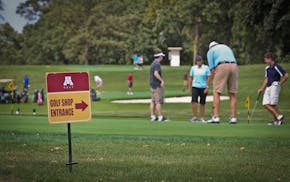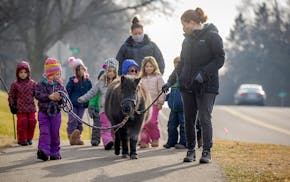The Minnesota Supreme Court opinion defining a "public place" on Wednesday was specifically targeted, relating only to a statute concerning rifles and shotguns in public places.
But legal experts and gun rights advocates believe the opinion's language will have a deeper impact.
The case dealt with a BB gun stuffed under the front seat of Kyaw Be Bee's car in St. Paul in 2022 that was discovered after a traffic stop and subsequent search. He was charged with a gross misdemeanor because he "did not have a permit to carry a firearm in public."
The charge was dismissed in Ramsey County District Court, because Judge Leonardo Castro ruled that state law did not clearly define the interior of a privately owned car as a public place. That decision was overturned by the Minnesota Court of Appeals, which determined when a rifle or shotgun is in a car on a public road it is in a public place. That interpretation was upheld Wednesday by the state Supreme Court.
Rob Doar, the senior vice president of the Minnesota Gun Owners Caucus, found it interesting that a case involving an improperly stowed BB gun could lead the Supreme Court to upend historical notions of private property on public roads.
"This is somehow a more serious thing that disregards additional historical privacy and warrantless search protections?" he asked. "It's really head-scratching."
"What this opinion is going to do is provide a lot of opportunities for prosecutors to say, 'Well, the Supreme Court decided here that there are some instances where a car is a public place, and here's the citation.'"
Peter Knapp, a professor of law with the Mitchell Hamline School of Law who is an expert on state Supreme Court opinions, said any wide-ranging legal fallout from the case stands outside the opinion itself.
"The court did a good job being very specific that the phrase 'public place,' and their definition of public place was a definition that was made under the particular subdivision of this statute," Knapp said. "That's not to say that other courts couldn't look at this and say that some of this reasoning applies to [other statutes], but that would be an interpretation of the opinion that goes beyond the four corners of the opinion itself."
Alicia Granse, a staff attorney with the Minnesota office of the American Civil Liberties Union, said her hope was that the law would not create a situation where automobiles are thought of as public places in general "and essentially losing an expectation of privacy in automobiles."
She noted that lawyers are already keenly aware of the "automobile exception" when it comes to private property and that it is far easier for a police officer to get into someone's car than it is their home. "The worry would be this opinion makes it easier," Granse said.
It is a lengthy paragraph of legalese, but Minn. Statute 624.7181, subdivision 1(c) describes a public place like this:
"'Public place' means property owned, leased, or controlled by a governmental unit and private property that is regularly and frequently open to or made available for use by the public in sufficient numbers to give clear notice of the property's current dedication to public use but does not include: a person's dwelling house or premises, the place of business owned or managed by the person, or land possessed by the person; a gun show, gun shop, or hunting or target shooting facility; or the woods, fields, or waters of this state where the person is present lawfully for the purpose of hunting or target shooting or other lawful activity involving firearms."
In his memo dismissing the lawsuit in Ramsey County District Court, Castro argued there was no evidence Bee's car was "owned, leased or controlled by a governmental unit" and the language did not clearly state that a person's private vehicle was a public place.
"The legislature has the power to amend the statute to include private vehicles as a public place, however this court does not."
The Court of Appeals and Supreme Court disagreed with that conceptually.
The Supreme Court opinion, written by Justice Anne McKeig, said the statute lists specific locations that are not public places for the purposes of the law, such as "a person's house, place of business, and land." All of these places are "immovable structures and land," McKeig writes.
She adds that the language makes clear that a public place "generally refers to the geographic rather than spatial location." For the courts, that means that when a gun is in a car on a public roadway, that roadway is the public place where it is illegal to carry the weapon, not the car using the road.
Even though McKeig's opinion is strictly about rifles and firearms and the single legislative statute, it will provide attorneys on all sides a new lens to examine a person's right to privacy on public roads.
"It gives a whole lot of latitude for the prosecution and from a law enforcement angle: If it's considered a public place, does that mean I don't even need a search warrant exemption if I believe the person has a BB gun, rifle or shotgun in the car?" Doar asked. "Now I get to search the car? It adds a whole lot more questions than clarity."
Granse said that latitude is concerning for several reasons, especially in a country where people often live in their cars on public roads and minorities are far more likely to be targeted for traffic stops and be convicted of firearms offenses.
"When we make it easier to get into people's cars, there are other effects downwind," she said.
Knapp said the court is firmly aware of the power of its language. In this instance, there are two views of how that power is being applied.
McKeig's opinion, which was joined by Chief Justice Natalie Hudson and Justices Sarah Hennesy, Gordon Moore, Karl Procaccini and Paul Thissen while Justice Theodora Gaïtas did not participate, is narrowly defined.
But that narrow definition is not going to stop attorneys from arguing that the Supreme Court has clearly ruled that there can be circumstances when a person's car is a public place.
"Good lawyers look for whatever they can find to make an argument," Knapp said. "They do look at anything. But that doesn't mean everything works. The opinion here, I think, has been pretty carefully confined to that statute. But that doesn't mean the argument won't be made, and it doesn't necessarily mean the argument won't be successful. But that's going to be a different case, and a different court is going to have to take a look at that."
Supreme Court allows DOGE team to access Social Security systems with data on millions of Americans

Thompson found guilty of murder in car crash that killed 5 young women

University of Minnesota is putting its golf course up for sale
Feeding Our Future probe: Apple Valley woman charged with defrauding food program of $1.4 million

